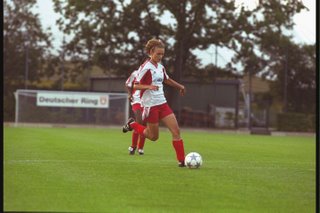
 Not pics from the World Cup, but from "Bend It Like Beckham" which is about the confluence of sport and society and a lot of other stuff. If you've never seen it do so. It'sdamn funny, very touching and it just might help you "get" soccer, at least in part.
Not pics from the World Cup, but from "Bend It Like Beckham" which is about the confluence of sport and society and a lot of other stuff. If you've never seen it do so. It'sdamn funny, very touching and it just might help you "get" soccer, at least in part. When I left the UK for the US, I also left soccer (it’s perfectly okay to use that term). Truth be told I’d left soccer when I went to college—I’d grown out of it. I thought the game was dull and I absolutely hated the hooliganism.
I think the last match I watched was when the US beat Sweden in the Women’s World Cup. It was a good game and a deserved win, but that was a special occasion and it wasn’t enough to rekindle a consistent interest.
Now comes the World Cup and it being special too, I thought it worth watching the opening match to see if I had really been missing anything during my self imposed and quite comfortable exile from the game.
Even before the first goal I realized what I’d been missing: “the beautiful game”.
I don’t love the teams, I don’t love the players but man, how I love the game! Watching the games brought back memories of when I used to play, and made me think of what is really involved, and how really difficult the game is.
Being English I couldn’t avoid soccer any more than I could avoid tea, grey “summer” skies, pervasive damp and Marmite. I think I was four when I took an interest, and eight when I took it seriously by joining “Mayford Athletic”, a newly formed local team in the “West Surrey Boy’s League” which comprised about thirty other teams, which meant a 30-game season played over 8 months.
Given that information the image that comes to my adult mind is a horde of small children mindlessly gravitating towards the ball in an hour-long melee with no discernable result, but in a soccer nation such random activity is (and was) not the case (think of the sophistication of the youngest Little Leaguer’s in the US).
There were no concessions to our size and youth; at 8 we played on full size pitches with full size goals in the regulation time.
The first match we ever played, we lost 7-1, our only goal scored by our goal-keeper who, disgusted with our pathetic efforts actually took the ball past us and the opposition the entire length of the field to score, to the amazement of everyone but himself.
Ashamed, we improved but we still ended up being the second-worst team in the league (BTW 3 years later we won the League championship in front of 18,000 spectators—a far cry from our typical 20 person attendances, mostly interested parents).
When you get onto the pitch, all you know is yourself and your team. There are no time-outs, no time to huddle to discuss strategies or tactics. Your coaches and the manager are sidelined—they are out of the game. The only respite is half-time and then you are too knackered and thirsty to listen to any speeches all you want to do is rest and then play again.
When you get the ball, you can “hold” it, run with it, pass it or just give it a “boot”. Whilst considering these options an opposing player is charging down on you whilst other opponents and your own team-mates are repositioning themselves. You have to be sure you have the ball under control so you can do something useful with it, or quickly and accurately deliver it to a teammate so that they can do something useful with it. And you have to avoid being knocked over by the opposition (which will void your options). You have to look at the ball, look at your rival, look at your team-mate, your team mate’s rival, consider tactic versus strategy and make a decision, all within 1/10th to 2-5 seconds. And all this has to happen between your brain and your feet.
When you don’t have the ball you have to figure out how to get it again and stop the other guy from exploiting possession and scoring. You have to either “mark” an opponent or mark a zone (like basketball) but a single zone can be at least half the size of a basketball court. You have to know when to stand your ground, harass or attack. You have to anticipate what your opponent might do, keep your eye on the ball and watch for misdirection. Timing the tackle is also critical—the penalty for getting it wrong can be anything from a free kick or a goal to being sent off and/or seriously hurting your opponent in the process.
On top of all this you have to know how to kick the ball whilst you are running and you have to know how to receive it too. You have to receive or deliver a ball anywhere from a distance of a few feet to 50 yards, on the run, in the air, bouncing, along the ground, ahead or behind or to the side of you and do something useful with it.
I guess the essence of football is in the creation of order out of its inherent chaos, and the pleasure comes from the ability to do so. Maybe that’s the key—maybe the rest of the world has learned to deal with chaos, whilst the US is perhaps only beginning to come to terms with it.
And speaking of chaos this post is quite a mess, but I’m all wrapped up in the immediacy of the World Cup. It’s like a good first date after a long hiatus—I can’t think straight, I’m just enjoying the moment, bursting with thoughts and words and all jumbled up. Screw it—I had to say something. I love this game.
For a deeper and more coherent insight, Tony Karon
http://www.tonykaron.com/ has written a gorgeous piece “How to Watch the World Cup: Politics and War by Other Means” and has other posts there that explain what I as yet cannot.
 Photo snagged from CrazyNews.net
Photo snagged from CrazyNews.net

